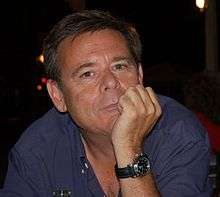Antonio Gómez Rufo
Antonio Gómez Rufo professionally known simply as Gómez Rufo (born 1954 in Madrid) is a Spanish writer
Antonio Gómez Rufo | |
|---|---|
 | |
| Born | 1954 (age 65–66) Madrid, Spain |
| Occupation | Writer |
Gómez achieved a law degree at the Complutense University of Madrid, he graduated in 1977 and between 1979 and 1983 he worked as a lawyer. In 1984 he began working as a screenwriter and poet for books. His debut was in 1984 when he wrote his first book entitled El último goliardo. He wrote the screenplay for the 1999 film París Tombuctú (which starred Michel Piccoli).
In 2005 Gómez won the Fernando Lara Novel Award for El secreto del rey cautivo.[1]
Books
- El último goliardo (1984)
- Natalia (1988)
- El carnaval perpetuo (1992)
- Aguas tranquilas, aguas profundas (1992)
- Crónica de nadie (1992)
- El Club de los Osos Traviesos (1993)
- La leyenda del falso traidor (1994)
- Un gato en el desván (1995)
- Las lágrimas de Henan (1996)
- Si tú supieras (1997)
- El desfile de la victoria (1999)
- El alma de los peces (2001)
- Los mares del miedo (2002)
- Adiós a los hombres (2004)
- El secreto del rey cautivo (2005)
- El señor de Cheshire (2006)
- Balada triste en Madrid (2006)
- La noche del tamarindo (2008)
- La abadía de los crímenes (2011)
- La más bella historia de amor de Paula Cortázar (2012)
gollark: Why not just MEDDLE WITH THE VERY FABRIC OF TIME ITSELF instead of changing working hours?
gollark: Tired of getting up at times which don't... align with the sun, or something?
gollark: It's a bad solution to a problem which I don't think even exists, which creates nightmares for programmers everywhere.
gollark: Daylight saving time is just so terrible.
gollark: I would run all my stuff with 24-hour UTC, but silly dodecahedra in this country made us have daylight saving time.
References
- "Antonio Gómez Rufo gana el Premio de Novela Fernando Lara" [Antonio Gómez Rufo Wins the Fernando Lara Novel Award]. El País (in Spanish). Seville. EFE. 6 May 2005. Retrieved 5 September 2018.
This article is issued from Wikipedia. The text is licensed under Creative Commons - Attribution - Sharealike. Additional terms may apply for the media files.